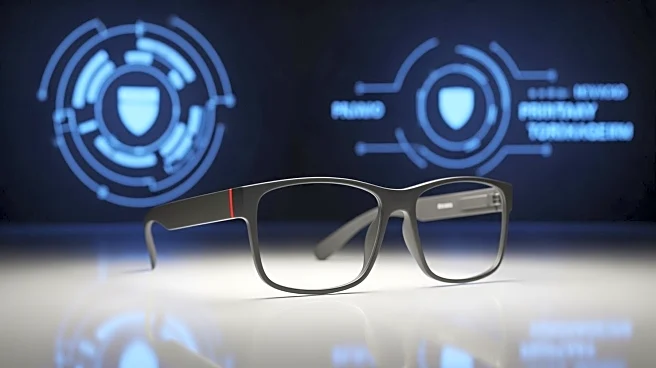What's Happening?
Meta's recent unveiling of Ray-Ban Display smart glasses has ignited a debate over design and privacy concerns. During the Meta Connect event, CEO Mark Zuckerberg described the glasses as delivering 'personal
superintelligence,' a statement that has drawn criticism from privacy advocates and designers alike. The glasses, which promise to integrate fashion with advanced AI capabilities, have raised questions about the implications of on-face AI technology. The announcement comes amid a shift in industry focus, with Apple pausing its Vision Pro overhaul to concentrate on AI glasses. The debate centers around whether these devices should be seen as convenient tools or potential surveillance devices.
Why It's Important?
The introduction of AI-powered smart glasses by Meta represents a significant shift in the wearable technology market. Privacy advocates are concerned about the potential for increased data collection and continuous inference, while designers emphasize the aesthetic and user value of the product. This polarization highlights the broader implications for consumer trust and regulatory scrutiny. As companies like Meta and Apple push forward with AI integration in everyday devices, the balance between innovation and privacy becomes increasingly critical. The outcome of this debate could shape future industry standards and consumer expectations regarding wearable technology.
What's Next?
The controversy surrounding Meta's smart glasses is likely to lead to increased regulatory attention and calls for clearer privacy controls. Companies may need to implement independent audits and opt-in controls for sensitive features to maintain consumer trust. As the market for AI-powered wearables grows, the industry could see accelerated product launches and stricter privacy guidelines. The ongoing debate will determine whether consumers prioritize convenience over privacy risks, potentially influencing the direction of future technological advancements in the sector.
Beyond the Headlines
The launch of Meta's smart glasses raises ethical questions about the role of AI in personal devices. The promise of 'personal superintelligence' challenges traditional notions of privacy and user autonomy. As technology continues to evolve, society must grapple with the implications of AI's pervasive presence in daily life. This development could lead to long-term shifts in how consumers interact with technology and the expectations they have for privacy and control.










